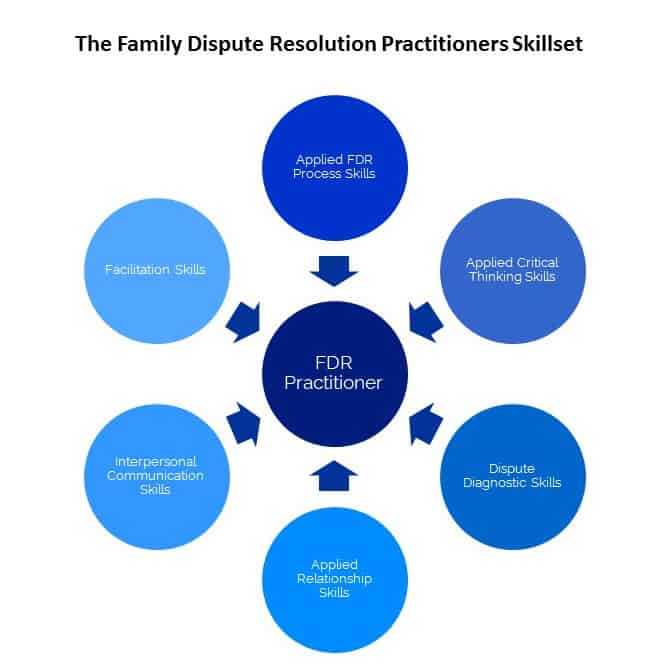This professional development course will teach you everything you need to know to be confident in facilitating property mediation as a Family Dispute Resolution Practitioner. The course fee includes all training and assessment delivered online at your own pace.
Who is this course for?
This course is for accredited family dispute resolution practitioners who are not confident in their facilitation of property mediation. This is usually because:
- You were not provided training in property mediation at the time you accredited as a FDR Practitioner
- You were trained back then but have not been facilitating property mediation and have grown rusty
- You want to learn how to use online mediation and spreadsheets to professionally facilitate property mediation
The course is only available to accredited Family Dispute Resolution Practitioners.
Delivery Model
Mediation Institute provides this training and assessment by eLearning.
That means that you can take the course from anywhere in Australia as long as you have reasonable internet access.
The course has a mandatory role play demonstration in order to receive a certificate of completion.
The course is self-paced allowing you to complete the course at your preferred pace.
- Theory is learnt via online learning which includes recorded and live webinars discussing different aspects of the skills and knowledge you require to facilitate Property FDR.
- Skills development is facilitated by live mentored video mediation role plays with other students. You will be mentored by a accredited Family Dispute Resolution Practitioners.
Course Duration
We estimate that the course takes about 20 – 40 hours to complete.
This includes the opportunity to practice facilitating with video mediation role plays which each take two (2) hours to complete.
Course content is delivered via eLearning and includes the assessment
The full course is competency based which means you will be required to demonstrate that you can facilitate property mediation in order to be issued a Property Family Dispute Resolution by Mediation Institute.
- Short answer questions and quizzes to review understanding
- Activities to develop skills and confidence
- Case studies to consider different scenarios
- Self-reflection to ensure that you are using a reflective practice approach to your work
- Practical demonstration (role plays) or workplace evidence if you are providing property mediation in the workplace to the satisfaction of your employer or clients
Course Content
This module is designed to make sure that you have a current understanding of the various laws that relate to the practice of Property Family Dispute Resolution.
It is essential that as a facilitator of property mediation you have a reasonable understanding of the family law system as it is important that you know whether or not your clients have a clear sense of the range of results they may be able to obtain from a court if mediation is not successful.
If you do not it is going to be difficult for you to know whether clients have had or understood their legal advice, to properly help them to reality test proposals and to provide them with legal information when appropriate.
In this module you will be required to read sections of legislation and create summaries related to your obligations as a FDR Practitioner in terms of property mediation.
You will also review workplace documents provided in a FDR service.
This module reviews your ethical obligations as a FDR Practitioner through the lens of property mediation.
There is a review quiz that allows you to consider a number of potential ethical dilemmas and a group discussion of other ethical questions that may arise.
This module looks at the paperwork required for property mediation.
If is designed for those who are adding property mediation to your practice to assist in reviewing your systems and processes to make sure that they are appropriate.
It is structured to look at the documentation required for each stage.
This looks at screening for suitability for property mediation rather than the basic risk screening for safety.
The focus is on the aspects of risk screening you need to determine if property FDR is appropriate or whether additional support or alternative arrangements are required.
This part of the course looks at the aspects of the pre-mediation process that relate specifically to property mediation.
These include negotiating with the parties what information to provide, preparation for negotiation in mediation, valuations and more.
Role Play Practice as a Mediator only available for those on the Property FDR Certificate Course
This looks at the process differences for property mediation and various ways that property mediation can be facilitated.
- face to face using a whiteboard
- online using excel
- online using software like FamilyProperty https://familyproperty.com.au/
Theory and the ability to participate in role plays as a role player for those on the Property FDR Support Package
Theory and role play practice, including as the mediator with assessment and a Certificate of Competence for those on the Property FDR Certificate Course.
Live mentored video role plays unless alternative arrangements are made.
There is currently consideration of changes to the Family Law Act 1975. A review of the family law system that was released in March 2019 has not proceeded to legislation and there have been other reviews and bills proposes. Our industry is waiting to see if there will be changes to the legislation that impact property settlements. The report from the Family Law Review Commission recommended very significant and far reaching changes which may continue to be ignored or may be adopted. https://www.ag.gov.au/families-and-marriage/publications/family-law-future-inquiry-family-law-system
This part of the course will focus on managing those changes as a FDR professional and strategies to maintain the currency of your knowledge. Alumni of this course will receive update information as it comes to hand.
FAQs
No. This is professional development for accredited family dispute resolution practitioners who want additional training in property mediation. See our CHC81115 – Graduate Diploma of Family Dispute Resolution course if you are not yet qualified to apply to be a FDR Practitioner.
We don’t believe that it is possible to lean basic mediation and property family dispute resolution in a 38 hour basic mediation course.
Our course is at the same level as our Graduate Diploma level training and the course you have done is not equivalent. This course includes knowledge and skills assessment. In our course we offer the opportunity to participate in video mediation role plays to develop and have your skills assessed.
Likewise a one day group workshop is not equivalent to this course.
The course is generally paid for in full up front however we are always willing to consider reasonable proposals for alternative arrangements.
You will have the opportunity to participate in more than one practice role play if doing the course online. You will be given feedback and the opportunity to participate in another role play until you develop all of the skills you need.
If your workplace has arranged an onsite role play day and you are assessed as not-yet-competent you can later participate in an online role play to further develop your skills.
We don’t know and don’t believe they can adequately train anyone (even if they are a lawyer) the legal and ethical obligations and skills required to facilitate property mediation in a 38 hour short course.
To be recognised as a Family Dispute Resolution Practitioner (family law mediator) under the Family Law Act 1975 you must complete the CHC81115 – Graduate Diploma of Family Dispute Resolution or equivalent higher education course.
NMAS is a possible pre-requisite to enrol in the Graduate Diploma level studies to become a Family Dispute Resolution Practitioner. You will have no status with the Attorney Generals Department (the regulator of Family Dispute Resolution Practitioner registration) with just NMAS Mediator Accreditation.
Mediation Institute offers this course via online learning (for the theory) and the skills development via video mediation. We do this for three reasons.
- To make the course flexible, accessible and without the associated costs to students to travel to a workshop.
- We want to equip our students to be mediators in the 21st Century where we believe that video mediation will become more and more popular and expected by clients and employers. The 2020 – 2021 pandemic proved the importance of being able to work remotely with our graduates fully equipped and able to deliver full service while other mediators struggled with upskilling, inadequate phone mediation or stopped working for the duration.
- We believe that intense workshops are not the best way to learn skills. They are done for convenience of the training provider rather than based on cognitive science or the way that humans learn skills. Repetition over time with intervals in between is the best way to build skills into our long term memories.
If you don’t want to learn how to facilitate Video Mediation it will be best that you find a training provider who does not share our vision for the future and only teaches via the traditional face to face workshop approach.
The best way to find out more about the course is to ring our Director of Studies, Joanne Law.
Joanne will answer any questions that you have about any aspect of the course and help you to work out if the learning method is right for you.
You can call 1300 781 533 to get through to Joanne or her work mobile 0401 293 500
If you are nervous about the video mediation or unsure if your internet connection or computer are able to cope we can arrange for a video meeting to find out.
Meet Our Supportive Training Team
All team members are accredited Family Dispute Resolution Practitioners

Joanne Law

Cynthia Brooking

Ken Speakman

Lee Lee

Paul Kenna Law
Property FDR Certificate
Training and Assessment - Continuous enrolment no need to wait-
Includes your assessment
-
Online learning through a Learning Management System (LMS)
-
Role plays organised by Mi with other students and fully online
-
Your assessment role play via online with Mi assessors
Not an accredited Family Dispute Resolution Practitioner yet?
Link to the Mi Mediator Network
Join the Mi Mediator Network
We host this free network as a support to Mediators. The Mi Mediator Network is for dispute resolution professionals who want to …
Network | Share Learning | Collaborate




